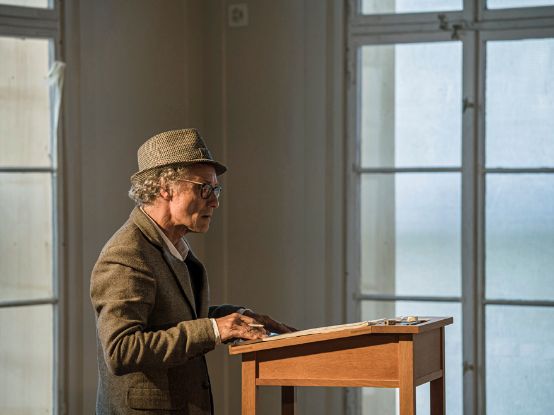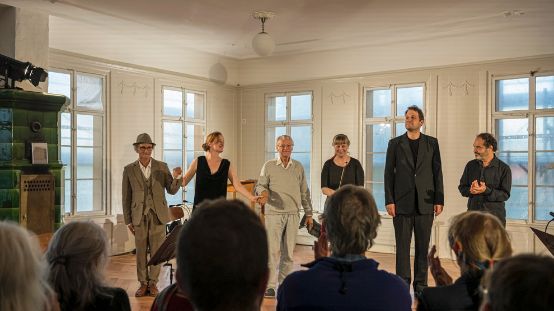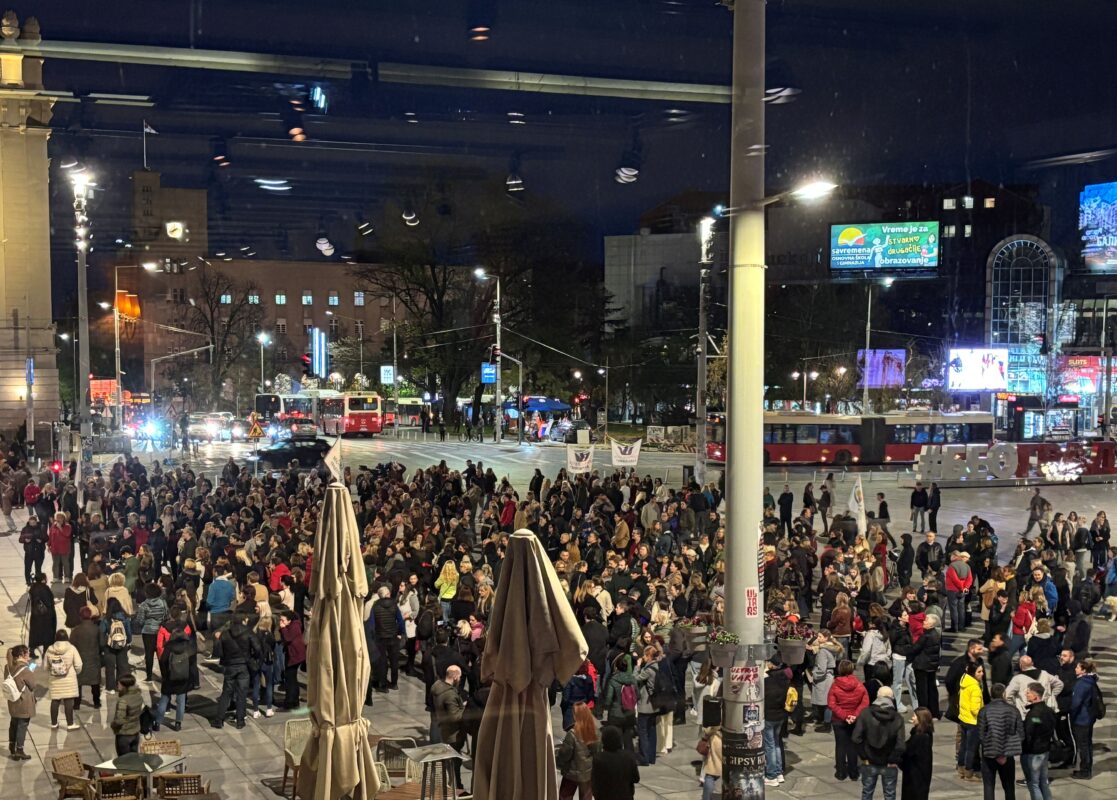"The clock strikes seven slowly" - Roland Moser's "European"
The music theater "Die Europäerin" by Roland Moser is based on a microgram by Robert Walser and has now been performed at the Rümlingen Festival in Appenzell.

A sheet measuring 17.5 x 8 cm, i.e. not even a third of the size of this newspaper, closely written on in tiny, seemingly illegible script. However, it contains: two not too short poems, a longer essay on Kleist as a playwright and a dramatization entitled The European. This microgram, which was given the number 400 by the executor of the estate, was probably written by Robert Walser in September 1927. Even if a few passages from the other texts can be found in the poems, one wonders what connects the four writings in three different text genres and why they have come together so densely on this sheet. A playful and plausible solution to this puzzle was presented on September 18 in the Rösslisaal in Trogen. Roland Moser's new music theater was performed there for the second and third time, having first been heard a month earlier in Cernier and now again as part of the Rümlingen New Music Festival.
The Basel-Landschaft festival, which stands for experimentation and open-air events, had relocated to Appenzell because of Walser. He had spent the last 23 years of his life in the Herisau sanatorium and nursing home and died in 1956 while walking in the snow. Contemporary music, which - not only in Switzerland - has dedicated itself to the texts and figure of this great Swiss poet with a crescendo over the last fifty years, has once again placed him at the center of attention.
A rich program was on offer over four days, for which the Rümlingen crew teamed up with musicologist Roman Brotbeck. He has just completed a major book on Robert Walser and music, and the Robert Walser Society also devoted its symposium in Herisau to this topic. Long sound walks were offered in a landscape through which Walser himself had once hiked with Carl Seelig, stopping less for a beer than for music, in barns or forest clearings or villages. Some successful pieces and performances could be experienced, for example by Brigitta Muntendorf, Sylwia Zytynska, Stephan Froleyks, Paul Giger/Andres Bosshard. But even the successful examples showed how difficult it is to capture Walser's character, this quirky sadness and inscrutability mixed with cheerfulness and playfulness. This was probably achieved most beautifully in the performance Es cho + es gofor which Gisa Frank and Urban Mäder worked together with wind players and actresses, mostly amateurs from the village of Rehetobel, to create a wondrously bizarre performance.
Getting closer to the incomprehensible poet
There were also four musical theater events: Patient no. 3561 by the collective Mycelium, based on Walser's medical records; a new version of Georges Aperghis' Witnesses (with the hand puppets by Paul Klee); the somewhat indecisive Tobold by Anda Kryeziu and in the middle of it all Moser's European. He succeeded in creating a production that was Walserian in spirit because he didn't want to cram too much onto it. Moser took the microgram sheet as a unit, so to speak, and unfolded it.
-

Performance of Roland Moser's "Die Europäerin" in the Rösslisaal in Trogen from left to right: Jürg Kienberger, Leila Pfister, Roland Moser, Helena Winkelman, Niklaus Kost, Conrad Steinmann
Moser (who was awarded a Swiss Music Prize in Lugano on September 17 together with Conrad Steinmann and other musicians) has already worked with strange text genres, such as letters, several times in his music theater work. He sees them as stimuli to juxtapose different ways of speaking, declamation and singing. Leila Pfister (mezzo-soprano) as the European and Niklaus Kost (baritone) as her friend delivered a subtle vocal duet, which was commented on by Jürg Kienberger (speaking); he also read the Kleist essay. The drama was thus rather reduced, the emotionality undermined, and yet the emphasis, strangely combined with restraint, remained intact. Flexible melodies and haltingly steady rhythms seem to alternate without further ado. It was hardly possible to identify with any of the characters, everything was contradictory. What was essential, however, was the addition of Helena Winkelman's viola and Conrad Steinmann's recorders (including ocarina), two other characters who declaimed wordlessly but very explicitly. Ingrid Erb had staged all this discreetly and without much effort. And so one felt closer to this strange poet in an intangible way. As it says at the end of one of the poems. "The clock slowly strikes seven, / and everything has remained completely incomprehensible to him."
"The European" - world premiere on August 21 in Cernier. Attended performance on September 18 in Trogen. Further performances on January 29/30, 2022 at the Gare du Nord Basel.
Festival Neue Musik Rümlingen, Sept. 15 to 19, 2021. A selection of the Rümlingen pieces can be heard on November 19 in the Alte Kirche Rümlingen.
Roman Brotbeck's book Sounds and sounds. Robert Walser settings 1912 to 2022 will be published in the fall by Wilhelm-Fink-Verlag Paderborn.








